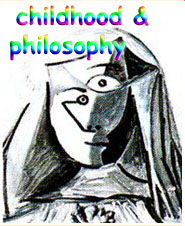on the need for a philosophy for / with mothers and fathers in the philosophy program for / with girls and boys
DOI:
https://doi.org/10.12957/childphilo.2019.42732Keywords:
philosophy for/with children, philosophy of childhood, unorthodox logics, classic children's and youth literature.Abstract
This article is a n exercise of critical and proactive reflection around on some of the foundations, interests, assumptions and developing practices of the philosophy for/with children program (P4wC). The critiques and proposals suggested here are the result of a stranger´s gaze, an authentic foreigner who has observed and thought from the edges of another boardwalk perspective the origins of and some of the developments proceeding from of Matthew Lipman’s and his collaborators’ work. It is the view of someone who has not been part of a in a research community of inquiry of practicing the P4wC program. It is the expression of an infant, who is not an infant because he lacks speech but because he speaks in a foreign language, with the advantages that 'Kohan' strangenessthis foreignness “à la Kohan” may have when this becomesenters into a dialogue with other epistemic communities. Thus, based on new research, the purpose of this writing article is to: 1) develop a philosophy for/with mothers and fathers (P4wMF), as a fundamental part of the P4wC program; 2) carry out an inclusion and development ofinclude and develop unorthodox and informal logics within the samethat program, in order to understand the thinking of girls’ and boys’ thinking in a more clear, efficient and enriched manner; 3) strengthen the links between the P4wC (including P4wMF) and the philosophy of childhood; 4) increase the experiences of the programprogram’s use of with classic children's and youth literature, especially with that which favors promotes the empowerment of girls and boys with respect toin their relationships with their mothers, fathers, caregivers, teachers and peers; and 5) also promote, with all these elements, the citizen civic education of the girls and boys as citizens.
Downloads
References
AGAMBEN, G. Lo que queda de Auschwitz : el archivo y el testigo, homo sacer III. Traducción: Antonio Gimeno. Valencia: Pre Textos, 2002.
AGAMBEN, G. Infancia e historia. Traducción: Silvio Mattoni. Buenos Aires: Adriana Hidalgo, 2010.
ALMARIO, J. y GALINDO, J. “Entrevista Walter Kohan: infancia, emancipación y filosofía” leído en “Universidad ICEI”, 8 de octubre de 2010. Disponible en: <http://www.icesi.edu.co/blogs/psicologia/files/2010/11/Entrevista-Walter-Kohan-Infancia-emancipacin-y-filosofa1.pdf> Última visita: 13/05/2019.
DÍAZ, M.; SÁNCHEZ, S. Contribuciones a la antropología de la infancia. Bogotá: Pontificia Universidad Javeriana, 2010.
DOYLE, A. Cinco aventuras de Sherlock Holmes. Traducción: Juan Antonio Molina y Esteban Riembau. Introducción y actividades: Diego Antonio Pineda. Madrid: Ciruela, 1999.
GARCÍA, F. (Coord.). Matthew Lipman: Filosofía y educación. Madrid: Ediciones la Torre, 2002.
GARRALÓN, A. Historia portátil de la literatura infantil. Madrid: Anaya, 2001.
GRAU, O. Filosofía para la infancia. Relatos y desarrollo de actividades. Buenos Aires y México, D. F.: Novedades educativas, 2006.
HOGG, T.; BLAU, M. El secreto de tener bebés tranquilos y felices. Consejos de una niñera experta. Traducción: Margarita Matarranz. Bogotá: Norma, 2005.
INFORME DEFENSORIAL. Bogotá: Defensoría del Pueblo, 2018. Anual. ISBN 978-958-8895-73-4.
KOHAN, O. W. Infancia: entre educación y filosofía. Barcelona: Laertes, 2004.
KUHN, T. S. La estructura de las revoluciones científicas. Traducción: Carlos Solís. México, D. F.: FCE., 2006.
LIPMAN, M. El descubrimiento de Harry. Novela de lógica formal. Traducción y adaptación para Colombia: Diego Pineda. Bogotá: Beta, 2003.
LIPMAN, M. Natasha: aprender a pensar con Vygotsky. Una teoría narrada en clave de ficción. Traducción Marta Pino). Barcelona: Gedisa, 2004.
LIPMAN, M. El lugar del pensamiento en la educación. Traducción y edición: Manuela Gómez. Barcelona: Octaedro, 2016.
LIPMAN, M.; SHARP, A. Escribir: cómo y por qué. Libro de apoyo para el docente para acompañar a Suki. Traducción: César Aira. Buenos Aires: Manantial, 1980.
LIPMAN, M., SHARP, A.; OSCANYAN, F. La filosofía en el aula. Madrid: Ediciones de la Torre, 1998.
PERINAT, A.; LALUEZA, J. L.; SADURNÍ, M. Psicología del desarrollo: un enfoque sistémico. Barcelona: Uoc, 2007.
PINEDA, D. Filosofía para niños: un acercamiento en: Universitas Philosophica, v. x, n. 19, p. 103-121, 1992.
AUTOR
AUTOR
SPOCK, B. Tu hijo. (trad. Floreal Mazía). Buenos Aries y Barcelona: Javier Vergara editores, 2001.
SKLIAR, C. Niñez, infancia y literatura en: Revista Crítica, a. 1. n. 1: p. 19-28. 2016. Disponible en: <https://criticapsicologia.unr.edu.ar/wp-content/uploads/2018/07/Ninez-infancia-y-literatura-Carlos-Skilar.pdf> Última consulta: 13/05/2019.
WITTGENSTEIN, L. Tractatus lógico-philosophicus. Madrid: Alianza, 1984.



